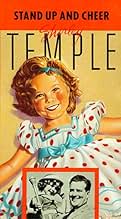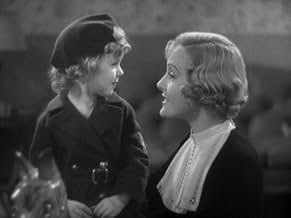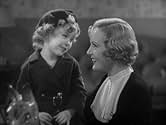Adicionar um enredo no seu idiomaA little girl's (Shirley Temple) toe-tapping musical numbers uplift the nation during the Depression in this charming classic that includes Temple's rendition of "Baby Take a Bow.A little girl's (Shirley Temple) toe-tapping musical numbers uplift the nation during the Depression in this charming classic that includes Temple's rendition of "Baby Take a Bow.A little girl's (Shirley Temple) toe-tapping musical numbers uplift the nation during the Depression in this charming classic that includes Temple's rendition of "Baby Take a Bow.
- Direção
- Roteiristas
- Artistas
- Prêmios
- 2 vitórias no total
- Aunt Jemima
- (as 'Aunt Jemima')
- Senator Danforth
- (as Mitchell)
- Senator Short
- (as Durant)
- Nick Foran
- (as Nick Foran)
- Hill-Billy
- (as 'Skins' Miller)
- Dancer
- (não creditado)
- Dancer
- (não creditado)
Avaliações em destaque
Take, for example, the show-stopping finale to "I'm Laughing," performed by Tess Gardella. There are a series of tableaux in this number, of various individuals all representing different marginalized groups: Immigrants, sweatshop workers, laborers of all kinds, all leading up to Tess Gardella herself busting out with the biggest, cheeriest performance of all, surrounded by a rousing, dancing chorus. It was clearly meant to recap the song's theme--if I can laugh, as downtrodden as I am, so can you--and to embody those who persevere and triumph over circumstance. With a swish of her ample hips and a gleam in her eye, Ms. Gardella triumphs.
The standard Stepin Fetchit routine has been analyzed everywhere, but let me just add that in this picture, the actor personifies African American resistance. In 1934 Black men were still not free from the vicious system of racial etiquette known as Jim Crow, and were therefore limited in the number of personae they were allowed to display. The genius of Stepin Fetchit is that he acts out the prescribed social role while frustrating those who prescribe it by withholding his intelligence and personality from the social interaction altogether. He slyly gives white people exactly what they demand,nothing more, forcing them to realize that perhaps that's not what they want after all. The resistance is his and the joke is on them.
As for Stepin Fetchit, he is marvelous!!! The man was a comic genius. I rate him as good as Stan Laurel. People nowadays keep stressing the stereotypes of minorities in old films. That's true, but even so, actors like Fetchit displayed great talent. And didn't most comedians, of any color, play stereotypical roles? Silliness has always been a source of comedy, whether it was performed by Stepin Fetchit, Stan Laurel, Cary Grant, or Willie Fung.
I love the musical numbers! They are upbeat, and happy. my favorite one is not Baby, Take A Bow, but Broadway's Gone Hillbilly. I think that The Picken Sisters sing in this number, although they are not listed in the cast.
The script is a mess, the editing is downright atrocious, the performances are flat, and nothing to keep your eyes open happens until Shirley bursts upon the screen with James Dunn and chorines in one of her most charming song-and-dance routines.
Believe me, the rest is worthless as entertainment and not even satisfying as a curiosity piece of the Depression era.
Let's face it. Shirley Temple became a star despite this mess of a movie and all because of one great number.
Temple and James Dunn are really the only bright spots in this production. Their on screen rapport is magic, and contrary to what others have stated, they BOTH hold their own during their crowd pleasing number "Baby, Take a Bow," in my opinion.
Truly a product of it's day. It's widely reported that this film brought smiles to the faces of many, and try as I may to ignore it's racial stereotypes, and bland dialogue, somehow the whole thing doesn't work.
But, as I have already mentioned, Jimmy and Shirley are pure magic.
It is always vital when examining old films to try to be sensitive to their context within their own time frames. Important movies of 70 years ago may look terribly trite now through absolutely no fault of their own. Judging by today's standards can often lead to pitfalls.
That having been stated, however, it is difficult to appreciate this film without seeing it for what it is: undeniably silly. And racist. And even a bit bizarre at times. But it contains one great jewel...
Earnest Warner Baxter & lovely Madge Evans certainly give the plot a try, but the script is dead set against them all the way, making him encourage hillbilly singers as the remedy for the nation's economic woes and having her mope about lovelorn & lonely.
As Aunt Jemima, blackfaced singer Tess Gardella (very popular at the time on Broadway's Show Boat) and especially Stepin Fetchit are embarrassingly stereotyped. It should be noted, however, that this sort of racial belittlement was not unusual in the Hollywood of the 1930's.
The physical, knockdown humor of Frank Mitchell & Jack Durant, playing a couple of zany U. S. Senators, is very odd & no longer funny. Odder still is the penguin that thinks he's Jimmy Durante.
Familiar faces show up from time to time - Nigel Bruce, Ralph Morgan, little Our Gang kid Scotty Beckett, warbling John Boles - but they are quickly submerged by the plot.
In the midst of all this clutter of mismatched parts, when all might be given up for lost, comes five-year-old Shirley Temple and she is an utter joy.
Shirley had already appeared in a series of features & shorts. But it was here, singing & dancing - and completely obliterating poor James Dunn who played her father - that the situation was ripe for her to march straight into the nation's heart. In 1935 Shirley would begin to star in her string of classic family films, and, with the death of Marie Dressler in July of 1934, the mighty moppet was to begin her reign as Hollywood's number one box office attraction.
So, with the arrival of Shirley Temple, we do indeed have much for which to STAND UP AND CHEER!
Você sabia?
- CuriosidadesFor the "Baby, Take a Bow" number with James Dunn, the studio felt it would be easier for Shirley Temple to do the dance she had done at her audition rather than learn a new one, so Temple spent her first day on the set giving Dunn dancing lessons.
- Citações
Lawrence Cromwell: Now, Miss Monroe...
Mary Adams: Er, Adams.
Lawrence Cromwell: Oh, yes, step here a minute, will you, please... something I want to show you. There's one phase in this amusement campaign which I think you ought to understand. The zones in...
[overcome by her good looks, he stops]
Lawrence Cromwell: You're beautiful.
Mary Adams: Ah, of course I'm not.
Lawrence Cromwell: What's that?
Mary Adams: I said I'm not beautiful.
Lawrence Cromwell: Young woman, you're talking to Lawrence Cromwell... Lawrence Cromwell, the world's recognized authority on feminine beauty and charm. Do you mean to stand there and question my judgment on the subject of beauty? Do you? Do you?
Mary Adams: Oh, no, no, I wasn't...
Lawrence Cromwell: Oh, but you DID question it. Now, you listen to me: when Lawrence Cromwell says a girl's beautiful, she's BEAUTIFUL, do you understand? Ha, the very idea! I demand an apology. Your personality definitely puts you in Class 10-A, Department B, with a double-X rating in my card index system. And, my system is the pre-eminent beauty catalogue of today.
[sizing her up at a glance]
Lawrence Cromwell: Height, 5 foot 4... weight, 116... bust, 34... waist, 26... hips, 36... calf, 12 and 1/2... ankle, 7. Questioning my judgement! Ha, ha, that is good.
Mary Adams: I'm really awfully sorry, Mr. Cromwell.
Lawrence Cromwell: Never mind, never mind, just... just let it be a lesson to you.
- Versões alternativasDifferent versions of this film exist, with various running times between 68 and 81 minutes. Some prints have deleted demeaning & outdated cultural depictions of African Americans that are offensive to modern audiences, including scenes with _Stepin Fetchit_ and _Tess Gardella_ in blackface as "Aunt Jemima".
- Trilhas sonorasStand Up And Cheer!
(1934) (uncredited)
Lyrics and Music by Lew Brown and Harry Akst
Sung by over the end credits
Instrumental over the title sequence and beginning credits
c. 1934 Movietone Music Corportation
Principais escolhas
- How long is Stand Up and Cheer!?Fornecido pela Alexa
Detalhes
- Tempo de duração
- 1 h 8 min(68 min)
- Cor
- Proporção
- 1.37 : 1



































